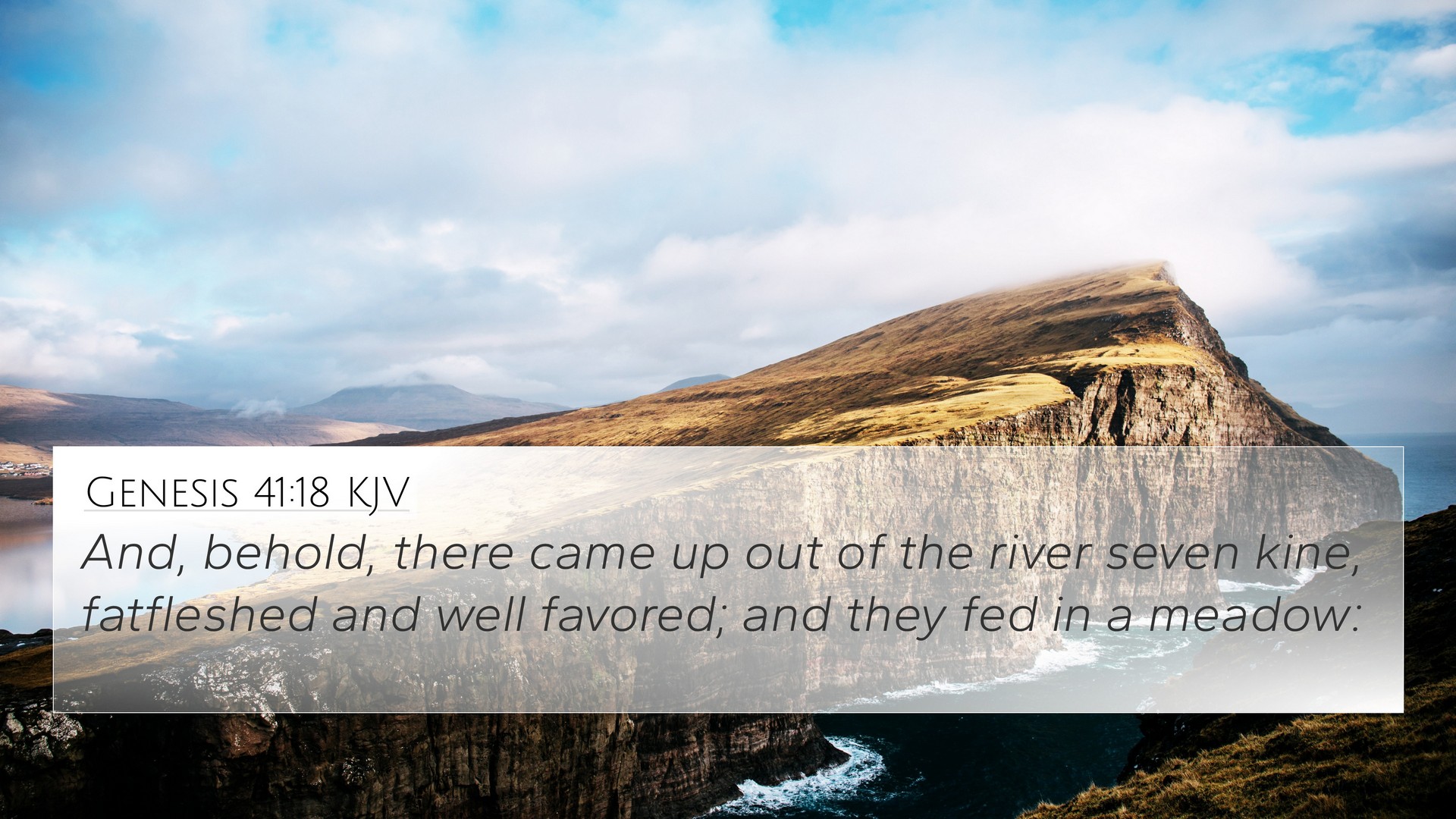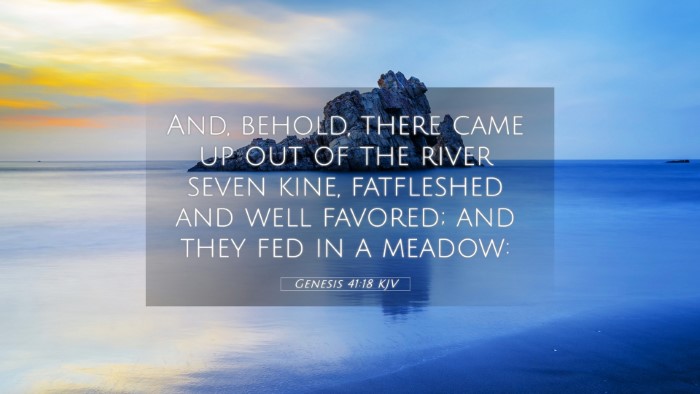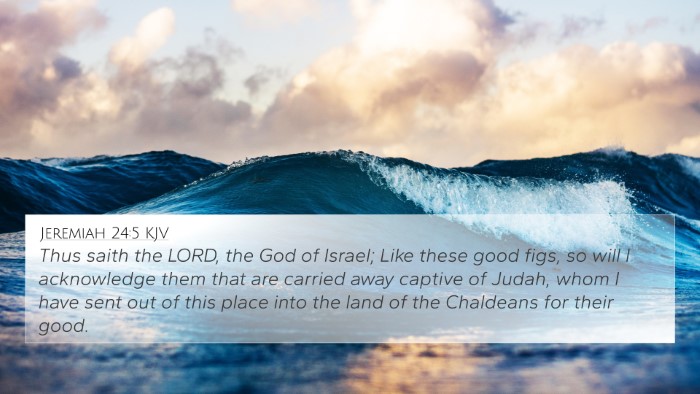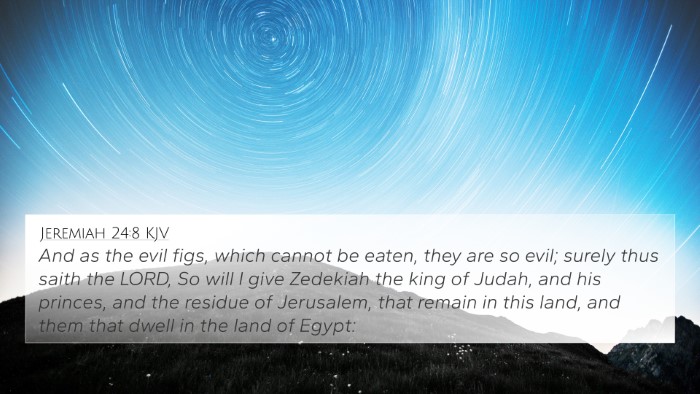Understanding Genesis 41:18
Genesis 41:18 states:
"And, behold, there came up out of the river seven kine, fat-fleshed and good-looking; and they fed in a meadow." (Genesis 41:18, KJV)
This verse is pivotal in the narrative of Joseph’s interpretation of Pharaoh’s dreams, which signifies the impending abundance followed by famine in Egypt.
Summary of Insights from Commentaries
Based on commentaries by Matthew Henry, Albert Barnes, and Adam Clarke, we find several layers of meaning in this passage:
Matthew Henry’s Perspective
Matthew Henry emphasizes the providential hand of God in revealing the future to Pharaoh through dreams. He notes that the fat-fleshed kine represent prosperity. The fact that they come from the river symbolizes the blessings and sustenance provided directly by God. It reflects a theme of divine communication where God uses dreams to prepare His people for what is to come.
Albert Barnes’ Interpretation
Albert Barnes provides a theological insight into the significance of the cattle. He explains that in ancient Egypt, cattle were symbols of wealth and plenty. The seven good kine signify a period of abundance, which is crucial for understanding the subsequent interpretation Joseph will provide about the coming famine. Barnes links this event to God’s mercy in revealing the future, allowing preparation for the hardships ahead.
Adam Clarke’s Analysis
Adam Clarke expands on the cultural context and offers historical insights into the cattle's symbolic nature. He sees this dream as a divine warning but also presents it as a foreshadowing of the Israelites' struggle during the famine. Clarke frequently cross-references similar motifs found throughout Scripture, indicating how God consistently warns and guides His people through prophetic visions.
Cross-References and Thematic Connections
Genesis 41:18 has numerous cross-references that highlight the themes of abundance, divine revelation, and preparation for future trials. Here are key Bible verse cross-references:
- Genesis 41:17-30: The full account of Pharaoh’s dream and its interpretations by Joseph.
- Exodus 3:8: God's promise of delivering Israel from famine and bondage.
- Psalms 105:16-22: Reflects on God's providence during Joseph's life.
- Matthew 24:21-22: Jesus speaks of tribulation, echoing the concept of preparation for difficult times.
- James 1:5: God gives wisdom generously, which relates to Joseph receiving insight for interpretation.
- Proverbs 3:5-6: A reminder to trust in God for guidance, paralleling Joseph's reliance on divine wisdom.
- Isaiah 46:10: God's declaration of declaring the end from the beginning aligns with the prophetic nature of dreams.
Connections Between Bible Verses
There are consistent thematic Bible verse connections throughout Scripture. The motif of preparation for both abundance and lack appears frequently:
- Genesis 30:43: Reflects abundance during Jacob's time.
- Proverbs 21:20: Advises prudence in resource management, relevant during Joseph's interpretation.
- Luke 12:16-21: The parable of the rich fool also addresses abundance and lack.
Using Tools for Bible Cross-Referencing
For those studying this verse, bible cross-reference guides can be incredibly helpful. Utilizing a Bible concordance helps identify related verses quickly:
- Cross-reference Bible study: Understanding how this verse connects to others enhances theological insights.
- How to use Bible cross-references: Look for themes of God’s provision and prophetic dreams.
- Bible chain references: Can reveal deeper connections within the narrative of Joseph.
The Context of Genesis 41:18
Understanding Genesis 41:18 involves recognizing the historical and cultural context of Egypt at the time. Cattle were considered vital to agricultural society and wealth. The good appearance of these cattle underscores the unprecedented prosperity Egypt would experience before disaster strikes.
In Summary
The significance of Genesis 41:18 lies in its portrayal of God’s foresight and the preparations warranted by prophetic dreams. The connections drawn from other Biblical texts offer further context and understanding of this pivotal moment in Joseph’s narrative. By exploring the thematic parallels and cross-referencing related verses, readers can gain a deeper understanding of the divine messages woven throughout Scripture.





